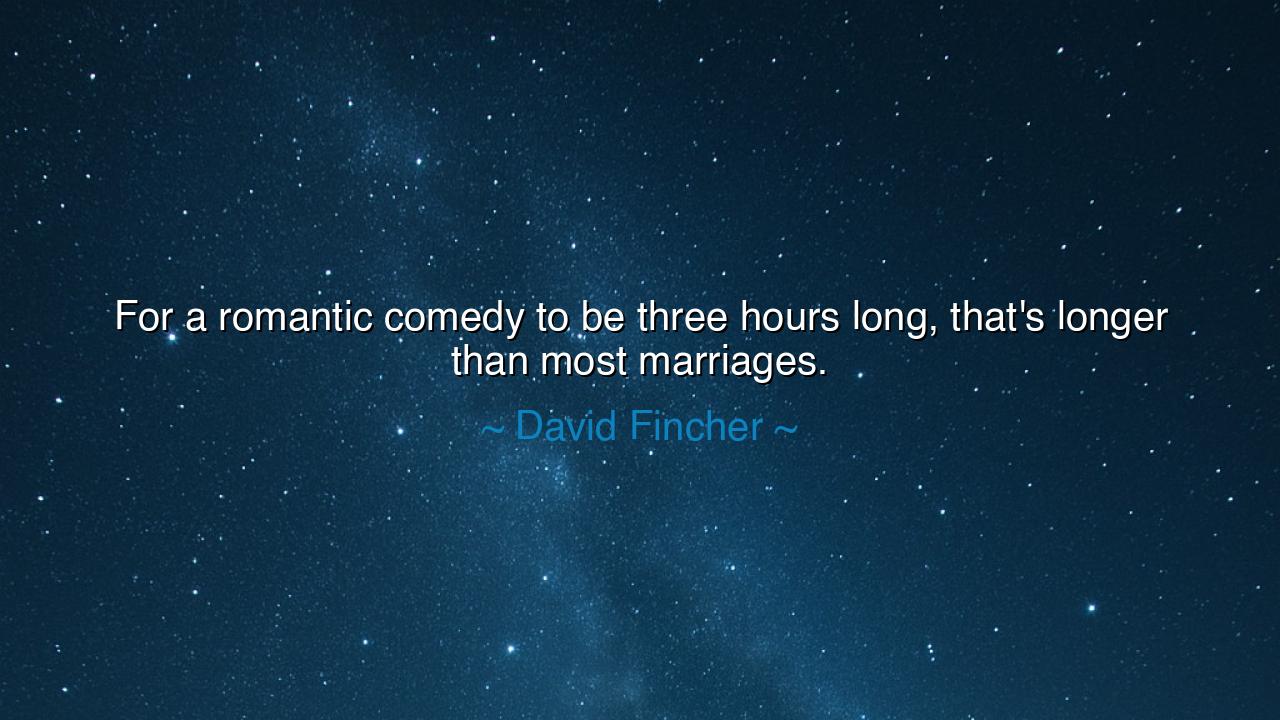
For a romantic comedy to be three hours long, that's longer than






“For a romantic comedy to be three hours long, that’s longer than most marriages.” Thus speaks David Fincher, with irony sharp as a blade, yet beneath his jest lies a bitter wisdom about love, time, and endurance. He places side by side the fleeting charm of a romantic comedy and the fragile span of many modern unions, and in doing so, he unveils a truth that generations have struggled to name: that beginnings are easy, but longevity is rare.
The romantic comedy is a tale of bright encounters, of misunderstandings and reconciliations, of laughter mingled with longing. It sweeps the heart into delight, but it is designed to end before weariness sets in. Love, in such films, is condensed into its most intoxicating moments, compressed into hours of passion and humor. Yet Fincher, with a sardonic eye, reminds us that many marriages—meant to last a lifetime—collapse faster than the length of a long film. His jest exposes a tragic paradox: that while we celebrate the glamour of romance, we falter in sustaining it.
The ancients, too, were not blind to this truth. In the days of Rome, marriage was often arranged for advantage, and many unions dissolved swiftly when fortunes changed. Yet they also honored those rare couples whose devotion endured beyond convenience. Consider the story of Pliny the Younger and Calpurnia, whose letters reveal tenderness, mutual respect, and enduring affection. Their marriage, unlike fleeting contracts, was a lifelong bond, a testimony that love can endure beyond the brevity mocked in Fincher’s quip.
The humor of Fincher’s remark springs from contrast, but its lesson is serious. It warns us not to confuse the romance of beginnings with the strength required for lasting partnership. The glittering hours of courtship, like the scenes of a comedy, may dazzle us—but what of the days after, when laughter fades into the silence of routine, when desire must learn to grow into loyalty, when love must withstand the storms of time? Here lies the true test of marriage, and too often it is here that bonds unravel.
Yet do not take this as despair. Rather, let it be a call to courage. If even a film can hold us for three hours, surely love can hold us longer—if we choose to nurture it. The romantic comedy ends at the wedding or the kiss; real life begins there. To make a marriage endure is to write the sequel that the film does not show: a story of patience, forgiveness, shared burdens, and daily devotion. This is not less romantic—it is, in truth, far more heroic.
The lesson, then, is clear. Let us not be content with the fleeting comedy of love’s beginning. Let us strive for the long narrative, the epic that spans years and decades. This requires discipline, humility, and the courage to love even when passion cools and storms arise. Those who endure discover that love matures into something deeper than comedy or tragedy—it becomes a partnership that shapes both souls into something greater than they were alone.
Therefore, take Fincher’s jest as a challenge. Do not let your love be shorter than a film. Build it stronger than laughter, deeper than desire, and more enduring than time’s trials. For the world has no shortage of brief romances; what it hungers for is the rare and shining example of love that lasts longer than all the comedies combined, a love that becomes not a performance, but a legacy.






AAdministratorAdministrator
Welcome, honored guests. Please leave a comment, we will respond soon